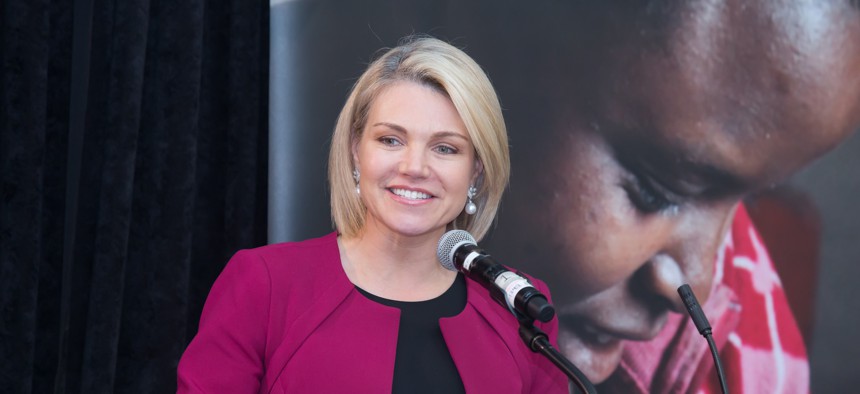If confirmed by the Senate, Nauert will come to the position with far less government experience than Haley, who had previously served in South Carolina’s legislature and as governor of the state. (It’s unclear at this point whether the UN posting will remain a Cabinet-level position, something Haley made a condition for accepting the job, or if it will be tucked below the secretary of state, as a number of previous administrations have done.) Nauert will likely face a bruising confirmation hearing, as Democratic senators scrutinize her qualifications to be one of America’s top diplomats.

Heather Nauert delivers remarks at the Save the Children event in March in Washington. State Department
Trump Chooses a Loyal Foot Soldier for the UN
Heather Nauert, currently the State Department’s chief spokesperson, is not known for challenging her superiors.
Nikki Haley accepted the job of U.S. ambassador to the United Nations when, as she tells it, Donald Trump assured her that she wouldn’t have to be a “talking head.” Now the president plans to replace her with a woman once described as “the new face of the talking head,” someone who quite literally speaks for the Trump administration.
On Friday, Trump revealed that he will nominate Heather Nauert, the State Department spokesperson, to succeed Haley, who in October announced that she would leave her post at the end of the year. Nauert is “very talented, very smart, very quick, and I think she’s going to be respected by all,” Trump told reporters.
Early on in his presidency, Trump’s eclectic mix of deputies often appeared to be executing multiple foreign policies at once. But Nauert’s appointment is an indication that Trump is now seeking out advisers who, no matter their personal views, cohere to the agenda of a president who seems to increasingly know what he wants and how he wants it done.
In a way, however, Nauert actually has more foreign-policy experience than Haley did at the outset. She has spent more than a year and a half as one of the U.S. government’s chief emissaries. In addition to serving as spokesperson, she temporarily filled in as an undersecretary responsible for overseeing American public diplomacy around the world.
A former broadcast journalist and anchor for Fox News—including for Trump’s favorite morning show, Fox & Friends—Nauert has emerged as a skilled messenger for Mike Pompeo’s State Department, following a wobbly start. During her first press briefing in June 2017, Nauert awkwardly rifled through an unwieldy binder of notes as journalists sat in silence, awaiting her answers. Pompeo’s predecessor Rex Tillerson reportedly excluded Nauert from his inner circle. Yet Tillerson, who frequently clashed with the president on matters of policy, was forced out of the administration. Nauert stuck around.
Since Tillerson’s firing, Nauert has become a close aide to Pompeo and settled confidently into the role. She travels with him on sensitive missions to North Korea and Saudi Arabia. With her binder of notes still in tow, she redirects inquiring reporters to the stances and prior statements of top administration officials with an air-traffic controller’s precision. And she carefully hews to the positions of her boss and her boss’s boss—with rare exceptions, such as when she rejected the idea that reporters are “enemies of the people” (she nevertheless agreed with the president that “fake news” is real) or dismissed as “absurd” a proposal by Vladimir Putin to interrogate American citizens for alleged crimes (Trump had described the Russian president’s idea as an “incredible offer”).
Ultimately, it’s this assiduous avoidance of getting ahead of her superiors that makes Trump’s selection of Nauert most significant.
Haley, on the other hand, has shown a remarkable independent streak. Reflecting on her tenure at the United Nations in an interview with me this week, she made the case for a foreign policy that emphasizes American values such as democracy and human rights just as much as American interests—a vision that bore little resemblance to the president’s more nationalist, transactional approach to international affairs.
In contrast to arguments Trump has made, for example, she maintained that the U.S. government didn’t need to choose between its interests and values in responding to the murder of the journalist Jamal Khashoggi by agents of the Saudi state. The United States could both recognize Saudi Arabia as a critical ally in confronting Iran and communicate that “we’re not going to continue to be your partners if you continue to use thuggish behavior,” she said. “We can’t give them a pass … because that’s not who America is.”
Granted, Haley was at the forefront of several of Trump’s core initiatives, from staunchly defending Israel at the United Nations to building the case for U.S. withdrawal from the Iran nuclear deal to pushing sanctions against North Korea through the UN Security Council. In our conversation, she credited the president’s threats of war against North Korea with helping her pass the sanctions and lauded the administration’s exit from the Iran deal and move of the U.S. embassy from Tel Aviv to Jerusalem as proof that the United States was “not afraid to stand alone if it’s for the right things.”
Yet she acknowledged that she and the president had substantive disagreements. “I get where he wants to go, and I just have my different style of getting us there,” she told me. “There are certainly things that we don’t agree on … My job is to go and do what he needs me to do. But for the most part, he’s been very willing to listen and very willing to come around.”
This independence was apparently by design. Trump “knew that I was someone that had strong beliefs and opinions and voiced them. And he said that that was one of the reasons he wanted me to do this job,” Haley once recalled.
These days, however, independence in the Trump administration seems more like a design flaw. And it’s in that context that Nauert could soon arrive at the United Nations. The Trump administration has both sought to reform the UN and steadily disengaged from it by pulling the United States out of the international body’s Paris climate agreement, Global Compact for Migration, and cultural and human-rights organizations, while cutting funding for the UN agency that supports Palestinian refugees—all on the grounds of putting America first.
When I asked UN Secretary-General António Guterres this fall whether he was worried about the United States under Trump withdrawing entirely from the United Nations, which the U.S. was instrumental in creating and sustaining after World War II, Guterres tellingly didn’t rule out the scenario. “I will do everything possible to avoid it,” he responded.
Nauert, for her part, didn’t spend a lot of time at the State Department discussing the United Nations. But it came up in the second question she ever fielded as spokesperson. Asked why she had released a statement that mourned the death of the head of the UN Population Fund and recognized his efforts to secure “stronger, more affordable and accessible maternal health and reproductive health care services,” given that the Trump administration had just accused the Population Fund of supporting abortion and eliminated all funding for it, Nauert toed the administration line.
“We sent out that announcement because he passed away,” she explained, declining to say whether the organization was doing good work or not. President Trump, she added, was focused on “protecting the interests of Americans first.”







